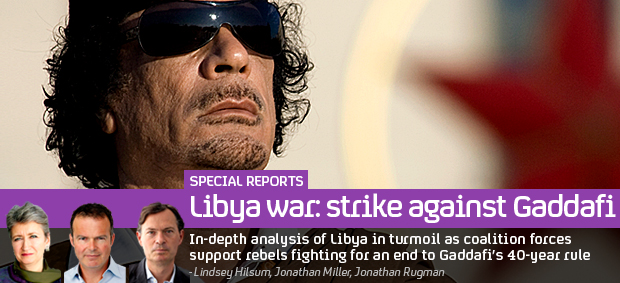Abu Salim, the 'spark' of Libya's revolution
The Abu Salim massacre of 1996, when 1200 prisoners were gunned down, may have been the spark that led to the Libyan revolution, as International Editor Lindsey Hilsum has been hearing.
There was only one moment when Wanise Elisawi showed emotion. We were at Abu Salim, the notorious prison in Tripoli where he had been incarcerated for 19 years, and he had been telling me how he had witnessed the 1996 massacre, in which 1,200 prisoners were machine-gunned down in the courtyard.
We walked into what had been his cell, shared with 13 others. “I stayed here for four years without seeing light,” he said. As tears started to well, he put his head in his hands. “I don’t know why I came back here today,” he whispered.
I tried to imagine the grey-haired engineer I met yesterday as he must have been 17 years ago. After doing his degree in the US, Wanise went to Morocco for military training, returning to Tripoli with a small band of men to attempt a coup against Colonel Gaddafi. It was May 1984. The coup plotters were thwarted and hunted down by Gaddafi’s “Revolutionary Committees”. Some 2000 were imprisoned. Eight were hanged.
Wanise has never before spoken publically about those years, but yesterday he described how some of his fellow prisoners went mad, and how he tried to to keep them clean, washing and shaving them, using cigarettes to bribe them to take medication. He talked of being forced to run full-tilt, blindfold into a wall time after time, of being tortured with dogs and electric prods, of watching cellmates die and their bodies lying infront of him for days on end.
He struck me as a man with deep feelings, carefully controlled and suppressed, who had endured and survived through stoicism and even now could scarcely dare to let his feelings show. “My daughter was a baby when I went into prison, and she was married by the time I got out,” he said. “It’s not easy.”
On June 28th 1996, Wanise watched in horror as Abdullah Sanussi, Colonel Gaddafi’s brother-in-law, came into the prison to handle a revolt by some of the prisoners. Desperate after years of starvation and beating, they had locked up one of the most hated prison-guards. Sanussi agreed that sick prisoners should be taken for treatment, and the others would get better food.
“He cheated them,” said Wanise. “He called them, ok bring out the sick people and they put them in buses here and drove them out of the gate. Then they killed them with machine guns.”
Wanise watched from the tiny window at the top of his cell as prisoners were gathered in the yard, and gunmen positioned themslves on the surrounding roofs. He recalled how one of the killers hesitated.
“I remember when the order came to him to start killing, he was not happy. He started hitting the car and said no, not killing, not killing, not killing. But then he executed his boss’s orders.”
The massacre at Abu Salim was to Colonel Gaddafi as Halabja, the gassing of the Kurds, was to Saddam Hussein. It was the moment when anyone who knew could see he had not a vestige of humanity. The families of the victims were not told what had happened for more than a decade. After he came to prominence in 2001, Saif al Gaddafi tried to negotiate compensation with them but their anger and grief was too great.
The families of Abu Salim victims started this revolution, after their lawyer was arrested in Benghazi on 15 February.
“Abu Salim was the spark. It changed our attitude towards this regime,” said Wanise, who has been advising the fighters who made the assault on Tripoli last week.
Wanise Elisawi has kept silent all these years, waiting for the moment it would be safe to speak. Now the regime which murdered so many of his comrades has gone, he can finally tell his story.
Follow @lindseyhilsum on Twitter.

